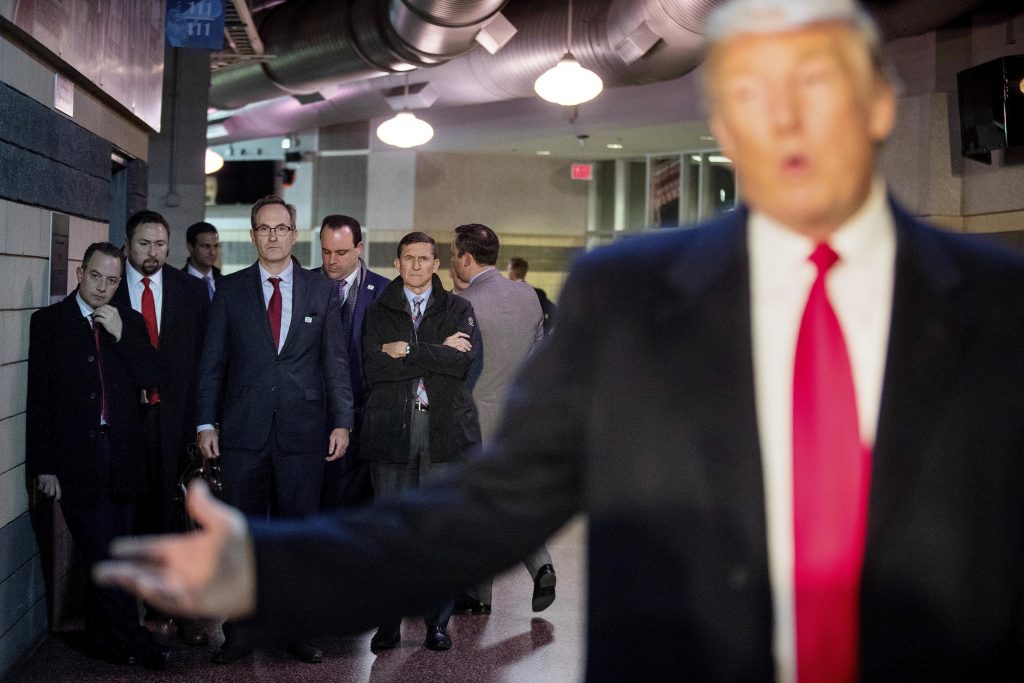A Field Guide to Trump’s Swamp

For me, a social anthropologist who has long studied how elites wield power and influence, President-elect Donald Trump and his Cabinet picks, near picks, and other associates make for a fascinating field study. This collection of primarily white men includes the wealthiest Cabinet members in U.S. history, chosen by the man who will be the wealthiest U.S. president ever. Many of them are slated to take charge of missions and bureaucracies they have vowed to thwart or even eliminate. And the vast majority of this homogenous group exhibit some form of conflict of interest, just like their chieftain, who, indications are, may take conflicts of interest to an unprecedented level for a U.S. president. Trump busts presidential norms not only in his own personal conduct but also in the number of conflicted players surrounding him—and in the magnitude of their conflicts.
Trump is only now taking office, and yet his legacy is already breathtaking. During the presidential transition, he has defied rules of both the modern democratic state (those of accountability, as seen in not releasing his tax returns, a rarity in recent memory), and the “free” market (those of competition, as seen in his strong-arming of U.S. companies like Carrier and Boeing). Such defiance, my research shows, is common among today’s most unrestrained and innovatively unaccountable power brokers, though Trump’s unapologetic brazenness is unmatched.
Trump has pledged to break these rules in spades as president, and in his flagrancy, has flouted all standards. Each day seems to bring a fresh shocker: reports that, as president, he won’t divest in his sprawling, global business and that his sons will run it; his inclusion of his daughter in meetings with heads of state even as she remains key to his business; using his Twitter pulpit, not market dynamics, to browbeat U.S. companies. A recent compilation of Trump’s entanglements published by The Atlantic ran to more than 8,000 words. Clearly, Trump is poised to use his official position to arrange personal business, as well as to strike job-saving, show-boating deals. Both eschew the market’s codes of competition and spurn a cornerstone of Western democracy: the separation of government and business. Yet, Trump has blithely dismissed questions about his obvious conflicts, stating that “the president can’t have a conflict of interest.”
During his campaign, Trump railed against a “rigged system” and promised to “drain the swamp” of players who have gamed that system to their advantage. But with the Cabinet members he has so far named, along with other top players under consideration or who have advised him, Trump has actively dumped more muck into the political swamp.
In many ways, Trump’s ascendancy is a product of our times. Over the past few decades, a confluence of developments has enabled corruption and much greater flexibility and hence manipulation to be built into the system, as I explain in my 2014 book Unaccountable. Perhaps most important for Trump has been the decline of traditional media, which he has exploited while capitalizing on the rise of online social media, an inexpensive new platform on which players can bypass traditional media gatekeepers, brand their message, and distort their adversaries’ words with ease.
Other seismic developments include financialization, fostered by both Republican and Democratic administrations since the 1980s, in which Wall Street has taken a wildly oversized role in the economy. Policymaking has become substantially subservient to the needs of this self-serving group at the expense of the greater public.
Also crucial have been privatization and deregulation, which gained major impetus in the 1980s. Privatization has meant that government work is increasingly carried out by for-profit companies and consultancies (three-quarters of all federal government jobs are now privatized). Those businesses and other entities receive far less oversight than federal workers. Moreover, the explosion of private companies carrying out government functions has also meant that huge salaries await the federal official or staffer who leaves public service for private work. Deregulation and privatization have turned many agencies into near-adjuncts of the industries they are supposed to regulate. Take, for example, the U.S. government’s Minerals Management Service (MMS), which was supposed to both oversee offshore oil drilling and generate government revenue from the industry. Given this mixed mandate, not surprisingly the MMS acted more like an arm of the industry, resulting in the deadly and devastating Deepwater Horizon oil spill disaster in 2010 (and, ultimately, in a dramatic reorganization of the MMS).
A further transformational development has been the dispersion of global authority after the end of the Cold War. This has created a huge number of new policy-influencing entities (along with a slew of new sovereign states), such as advocacy, consultancy, and think tank organizations. This change has vastly increased the number of entry points for influencers who perform overlapping and less-than-transparent roles.
These developments, taken together, have resulted in a “gamed” system—one that is far less accountable to regular citizens than any in living memory. People feel powerless, and Trump capitalized on their discontent in his campaign. Yet so far he seems not only highly unlikely to ameliorate the problem—he is setting the scene to make it exponentially worse.
Trump’s supporters praise what they call his “outsider Cabinet” for having credentials acquired apart from government and establishment politics. But in fact most of them are in some vital way insiders to the industries (or the government) they will now be charged with engaging, managing, or overseeing.
One such Cabinet member is Rick Perry, named as Trump’s intended secretary of energy, who sits on the board of oil and gas companies that contributed millions to Perry’s campaigns for Texas governor and U.S. president. Steven Mnuchin, a Wall Street insider tapped to head the Treasury Department, founded and ran what is now OneWest Bank, which received nearly a billion dollars in U.S. government bailout money. Jay Clayton, chosen to run the Securities and Exchange Commission, has spent much of his law career defending the Wall Street firms he would now police. Wilbur Ross, picked for secretary of commerce, has made a fortune in steel—an industry whose future depends in part on decisions made by the Commerce Department. Rex Tillerson, Trump’s choice for secretary of state, forged such a close relationship with the Kremlin as CEO of Exxon Mobil Corp. that he earned its high praise; it seems likely that he will continue to show favoritism toward his longtime business partner. Congressman Tom Price of Georgia, picked to take the helm of the Department of Health and Human Services, was actively trading health care stocks at the same time he was shaping health care policy.
None of this is very comforting for those, like me, who study the accountability and behavior of power brokers. But perhaps an even bigger concern are some of Trump’s other picks, advisers, and associates who qualify as “shadow lobbyists,” a term that journalist and co-author Linda Keenan and I developed in 2010 as part of my taxonomy of elite players. Consider, for example, the following list:
- Retired Army Lt. Gen. Michael T. Flynn, who is Trump’s choice for national security adviser, runs his own consulting firm (as do many other retired military peers), called Flynn Intel Group Inc. As is often the case these days, Flynn’s firm is registered as a lobbyist, but the top player—Flynn himself—is not. Flynn was paid to appear at a celebration of Russia’s state-run “news” outlet RT television in 2015 alongside Vladimir Putin but won’t reveal his fee. One of his clients has been linked to the Turkish government in the press, casting suspicion on Flynn’s motivations for writing an op-ed this past fall supporting Turkey’s autocratic leader. None of this kept Flynn out of classified briefings during the presidential transition from Obama to Trump.
- A consulting company owned by Newt Gingrich, a regular from the Trump campaign trail and an apparent adviser to the transition team, earned more than US$1.6 million from Freddie Mac, a government-backed home mortgage and loan company, in the lead-up to the 2008 financial crisis. Gingrich denied direct lobbying (at one point arguing he was merely a “historian” for Freddie Mac), but his firm “reported directly to Freddie Mac’s public policy and lobbying office,” according to one account. This one-step-removed arrangement is now commonplace and enables shadow lobbyists plausible deniability. Gingrich also denied lobbying for ethanol interests, so it raised eyebrows when industry IRS filings revealed he took in more than US$300,000 from that industry in 2009. He also founded a so-called think tank, the Center for Health Transformation, to promote the policy desires of its health industry sponsors. Gingrich is now making money from his association with Trump, reportedly increasing his speaking fee by US$15,000 because of his close ties to the president-elect.
- Myron Ebell, serving as the leader of the Environmental Protection Agency transition team, is a longtime climate change denier with the Competitive Enterprise Institute (CEI), a self-described libertarian think tank funded by the energy industry, among other donors. CEI is viewed as an advocacy arm for an array of polluting industries and the billionaires who help to support it. Trump has installed similarly compromised “think tank” influencers as transition leaders at both the Energy Department and the Interior Department.
- Rudy Giuliani, a still-vocal Trump advocate who Trump shortlisted as a candidate to run the State Department, owns the consulting firm Giuliani Partners, which has any number of potential conflicts. Clients have included the governments of Qatar and Venezuela, controversial painkiller giant Purdue Pharma, and a Canadian energy firm behind the Keystone XL pipeline, among many others. While it has been extremely unusual for secretaries of state to have significant and diverse connections to big business, none of Giuliani’s disqualified him from the shortlist. Merely being shortlisted for such a post is useful to his firm in generating new business. Nor did his connections exclude him from being named a cybersecurity adviser to the president-elect, an arena in which Giuliani has any number of conflicts. His firm has reportedly advised identity protection company LifeLock Inc. and insurer Aon on cybersecurity, and he is on leave as chair of the cybersecurity practice at the global law firm Greenberg Traurig.
Conflicts of interest and shadow lobbying are by no means confined to the incoming administration or to Republicans; many compromised power brokers were involved in the Obama and Clinton administrations. But Trump smashes standards in the sheer breadth of conflicts held by his Cabinet and advisory picks.
Trump’s jaw-dropping approach to his own conflicts makes shadow lobbying look nearly humdrum. Just as bad are his flamboyant, incessant promises to attack the problem, leading regular citizens to believe he is “doing something.” His over-the-top hypocrisy doesn’t bother me as much as the possibility that people may actually believe him, while in fact, he either doesn’t understand the problem or is willfully oblivious to it.
One report said that Trump would require any lobbyists working for his transition team to “deregister” from the official list of lobbyists, as if this was a preventive fix to corruption. A look at the long list above shows that one does not have to be a registered lobbyist to have troubling conflicts. It also shows that some of the most powerful influencers never register anyway, but, among other strategies, they delegate their power to underlings and bypass the reporting system entirely. The number of registered lobbyists has, in fact, fallen about 27 percent from its 2007 peak. But no one, even Trump himself, would say that the business of influence has declined since 2007. It’s just become less transparent than ever.
If we add to all this Trump’s reluctance to grapple with his own conflicts of interests, the forecast for the swamp of Washington is murkier than ever, with little visibility. Put on your fog lights.

































